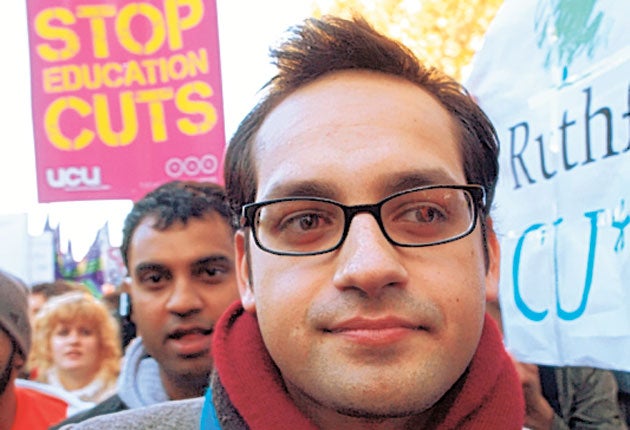He can afford fees now... student leader Aaron Porter gets job on £125 an hour
His consultancy advises universities on the range of challenges from reforms to higher education

Your support helps us to tell the story
From reproductive rights to climate change to Big Tech, The Independent is on the ground when the story is developing. Whether it's investigating the financials of Elon Musk's pro-Trump PAC or producing our latest documentary, 'The A Word', which shines a light on the American women fighting for reproductive rights, we know how important it is to parse out the facts from the messaging.
At such a critical moment in US history, we need reporters on the ground. Your donation allows us to keep sending journalists to speak to both sides of the story.
The Independent is trusted by Americans across the entire political spectrum. And unlike many other quality news outlets, we choose not to lock Americans out of our reporting and analysis with paywalls. We believe quality journalism should be available to everyone, paid for by those who can afford it.
Your support makes all the difference.Aaron Porter, the former president of the National Union of Students who led the campaign against £9,000 tuition fees, has returned to the public stage as a "higher education consultant", charging universities £125 an hour for his services.
Aaron Ross Porter Consultancy advises universities on the "range of challenges and opportunities" presented by the ongoing reforms to higher education.
Porter, who stood down as NUS president in June after one term in office, has advertised a rate of £8,500 for a two-week consultancy course. Most top universities will charge £9,000 per year for tuition from 2012.
The Government says reforms will improve student choice, but critics say they represent the introduction of market forces to higher education and could see middle-ranking universities unable to compete.
"My time as NUS president gave me a unique perspective on the funding reforms," Porter said. "I've spent a lot of time thinking about what the consequences would be of a market-oriented system. Some universities have been slow to react and they now want to up their game."
Mr Porter said he was "uncomfortable" with the idea of a market in higher education, but believes universities should do more to improve the service they provide students. "I have been working with university senior management teams to try and get them to better understand the sort of things they need to do: to listen to students; to give feedback more quickly; resolve complaints more speedily and demonstrate what they're adding in terms of value to the student experience, different to other universities," he said.
While in office, Mr Porter faced accusations from the left-wing of the student movement that he had not been radical enough in his opposition to the fee rise. His advisory services are catered for university managers, vice-chancellors and student-union executives.
Mr Porter said he did not believe his consultancy fees were excessive and that he has never charged the full rates advertised on his brochure, but instead offered tailored packages to meet universities' needs. Many consultants charge universities up to £2,000 per day for advice on educational strategy, he said. He declined to reveal the universities with which he has worked.
Michael Chessum, an NUS executive member and co-founder of the National Campaign against Fees and Cuts, said that it was "shocking" that Mr Porter had taken up the role.
"Universities are run by unaccountable, unelected managers who spend tens of millions of pounds on consultancy firms while raising fees and making staff redundant," he said.
"It's an indictment of the politics of some parts of the NUS that a former elected representative should now be feeding into that culture."
Mr Porter, a Labour supporter, is involved in politics at a local level. He said that though he has considered parliamentary politics in the past, it is not something he is interested in "right now". At a rally in Manchester in January he was heckled by students who called him "a Tory too". He remains critical of the Coalition's education policy and called the scrapping of the Educational Maintenance Allowance for low-income teenagers "bordering on criminal".
Join our commenting forum
Join thought-provoking conversations, follow other Independent readers and see their replies
Comments